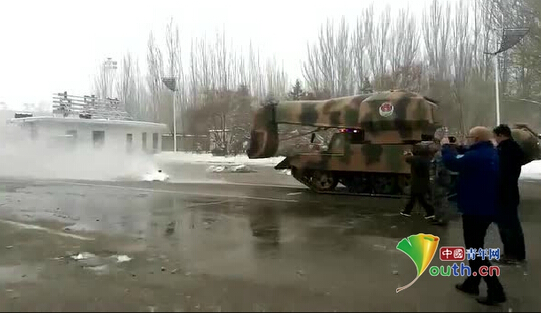NPC mulls several laws, prepares for annual session
China’s top legislature Wednesday started its bimonthly session, with lawmakers deliberating revisions to several laws and preparing for the annual session of the 12th National People’s Congress (NPC) in March.
Zhang Dejiang, chairman of the NPC Standing Committee, presided over the opening meeting.
Legislators considered a report on the work of the NPC Standing Committee, which will be submitted to the March session.
They reviewed a draft agenda of the annual session, a draft list of candidates for the session presidium and secretary-general, as well as a list of observers.
They reviewed a report on the qualifications of some NPC deputies and discussed appointments and dismissals.
Lawmakers also deliberated revisions to the law on the Red Cross Society, the law on corporate income tax and the Unfair Competition Law.
Law on Red Cross Society
The draft revisions to the Law on the Red Cross Society aimed to further boost transparency and credibility of the country’s Red Cross societies.
According to the new draft, which was brought for a third reading, Red Cross societies in China and their staff are required to give feedback to donors on the use of their donations in line with the law.
Those in charge and staff members directly responsible who fail to do so could face civil and criminal charges, it said.
Meanwhile, a previous clause giving Red Cross societies the power to “rectify” illegal activities carried out by their subordinate societies and staff members was deleted from the new draft.
China’s Red Cross has in recent years grappled with trust issues.
Revision work for the Law on the Red Cross Society began in 2015.
The first reading of the draft revision suggested independent third-party agencies should audit donations, while the second draft expanded the Red Cross societies’ duties in the donation of stem cells and organs.
The third reading, however, specified that Red Cross societies could “participate in and promote” blood, body and organ donations, and could participate in and carry out “work related to” stem cell donations.
It also said leading supervisors at all Red Cross societies must be chosen through a “democratic process.”
The new draft has addressed public concerns and included pertinent revisions to the existing law, Zhang Mingqi, a vice director of the Law Committee of the NPC, told lawmakers Wednesday morning.
It will better safeguard and regulate Red Cross societies in performing their duties in accordance with the law, and boost its credibility, he said.
At a panel discussion, Shen Yueyue, vice chair of the NPC Standing Committee, said that the revised law is expected to boost the credibility of the country’s Red Cross societies and ensure their role in the humanitarian field could be fully played.
Unfair competition law
Lawmakers started to review a draft amendment to the Unfair Competition Law, as the country strives to build a socialist market economy.
The draft revision, the first since the law came into force in 1993, was given a first reading at the bimonthly session.
As the market economy has evolved and new business models have emerged, some of the law’s existing clauses do not properly address unfair competition, Zhang Mao, head of the State Administration for Industry and Commerce, told lawmakers.
The draft under consideration expands the scope of unfair competition to cover commercial bribery, false commercial propaganda, tie-in sales without buyer consent, and deceitful prize allocation, according to the draft.
It stipulated that operators can not use the names, branding or titles of established entities.
Bribery or influence to affect the outcome of a deal is banned, according to the draft.
The draft in particular stipulates that malicious activity on the Internet used to coerce buyers or disturb other businesses is also banned.
The banned activity includes misleading, cheating or forcing users to “modify, close or unload” products or services, the draft said.
It also includes products or services that are maliciously designed to not be compatible with other products or services, it noted.
The draft also stated that any activity that seriously disturbs competition order but is not currently covered by laws or regulations should be reported to the State Council, according to the draft.
The State Council will establish a coordination task force tasked with studying major policies against unfair competition.
Violators could face fines up to 3 million yuan (about 436,170 U.S. dollars) or have their business licenses revoked, it said, adding that they could also face criminal charges or have their violations recorded in a credit record system.
A draft amendment to the law on corporate income tax was also submitted to legislators for reading on Wednesday.
The draft is expected to address the common complaint that businesses making large donations do not get enough tax concessions.
The government has waived corporate income tax on donations made by companies from their profits, but this only applies to companies that donate 12 percent of their profits or less.
The new draft stipulates that if a company’s donation exceeds the 12 percent in one year, the balance can be deducted from the taxable income over the following three years.
